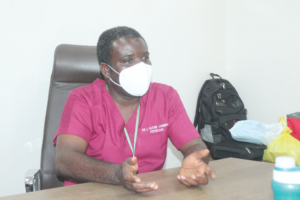Cloth facemasks are less protective against COVID-19

Dr Joseph Oliver-Commey, an Infectious Disease Specialist at the Ghana Infectious Disease Center, says the efficiency of cloth masks in protecting people against the Coronavirus is lowered when used in crowded areas.
He told the Ghana News Agency in an interview that generally, all masks were protective against Coronavirus because they formed a barrier to infections when the mucous membranes, ‘nose and mouth’ were covered but the cloth masks, were less effective.
“There are many types of masks and they serve the same purpose at different times…,” he said and recommended the use of medical masks for workplaces because, “usually in the office, people are close and indoors.”
“Most workplaces use air conditioners, which may be circulating same air so medical masks are advised for those who work with COVID-19 infected people, and N95 masks are also recommended,” he said.
The Infectious Disease Specialist said the key to protecting oneself no matter the strain of the virus was to practice the barriers, stressing, “Use a face covering to cover the mucous membranes, nose, and mouth, wash off any viruses on your hands that you might have picked up along the way while interacting with people.”
He encouraged people to avoid overcrowded places.
In a related development, a top scientist reportedly warned that cloth sheet masks were not going to protect people from the fast-spreading covid-19 Delta variant.
Michael Osterholm, an epidemiologist, and director of the University of Minnesota Center for Infectious Disease Research and Policy, reportedly said that most masks were ineffective.
He explained that people who wore a cloth mask during a wildfire, were still able to smell the burning flames, exposing the flaws of a cloth mask.
“I think, though, if you’re going to consider wearing a mask, the quality of the mask does matter. So if you can get your hands on a KN95 mask or an N95 mask, that’s going to afford you a lot more protection,” he said.
Facemasks are protective devices covering a part of the face.
They are designed to protect both the person who wears them and the immediate environment from breathable pollutants, respiratory poisons, or bacterial/viral pathogenic organisms.
Epidemiologists emphasise that wearing appropriate facemasks will effectively interrupt airborne infections in the community and stop the spread of COVID-19.
Source: GNA
